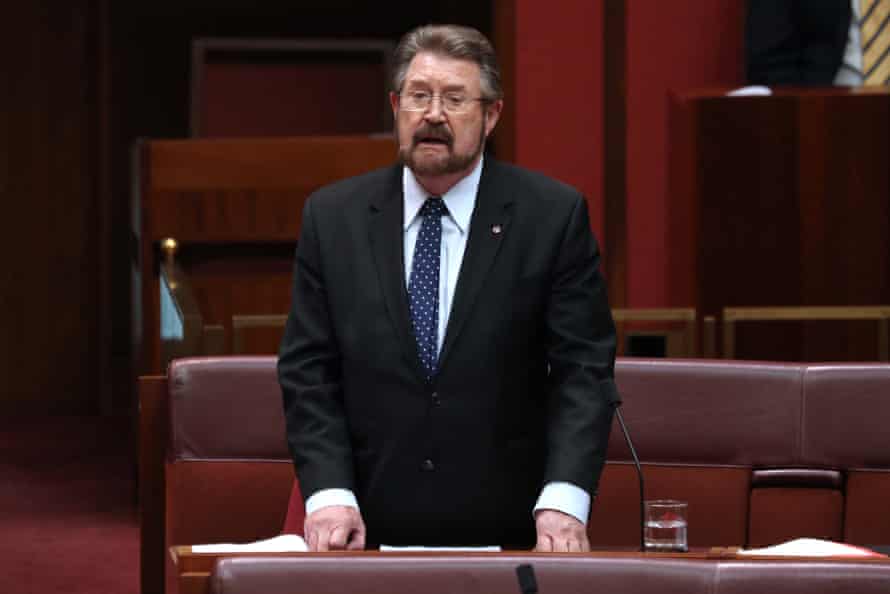
Fair Work Commission rules on 5.2% increase to minimum wage

Paul Karp
The Fair Work Commission has ordered the national minimum wage to increase by 5.2%, lifting the national minimum wage from $20.33 to $21.38 an hour. That is a $40 per week increase.
Modern award minimum rates will go up 4.6% “subject to a minimum increase of $40 per week”.
Justice Iain Ross:
In effect, modern award minimum wage rates above $869.60 per week will receive a 4.6% adjustments wage rates below that level will be adjusted by $40 per week.
The decision sets the pay of at least 2.7m workers on the national minimum or award minimum wages.
Ross said the “most significant changes” since last year’s decision was “a sharp increase in the cost of living and the strengthening of the labour market”. He noted the low-paid are “particularly vulnerable” to high inflation, which “erodes the real value of workers wages”.
Ross said:
At the aggregate level, labor market performance has been particularly strong. The unemployment rate has fallen to 3.9% compared to 5.5% in April 2021. At the time of the last review, measures of underemployment have also fallen. The improvement in the labor market is forecast to continue in the period ahead. There has also been a sharp rise in the cost of living since last year’s review at the time of last year’s decision, the consumer price index and the underlying measure of inflation. Both stood at 1.1%. The comparable figures now standard 5.1% for the CPI and 3.7% for the trimmed mean or the underlying inflation rate. There is also a marked difference in the inflation forecasts.
Ross said these figures weigh in favour of a higher increase, because employers’ groups’ calls for a moderate increase of about 2.5% would result in real pay cuts.
So, just going back over Fair Work Commission president Iain Ross’ announcement, here is what he said went into the decision:
Given the current strength of the labour market, the adjustments we propose to make will not have a significant adverse effect on the performance and competitiveness of the national economy.
In our view, awarding an increase in modern award minimum wages of the magnitude proposed by ACCER, some 6.5 per cent, and the ACTU – 5.5 per cent, would, in the present economic circumstances, pose a real risk of significant adverse effects to the national economy.
We acknowledge that the increases we have determined will mean a real wage cut for some award reliant employees.
This is an issue that can be addressed in subsequent reviews.

Paul Karp
Minimum wage rise delayed until October for aviation, tourism and hospitality sectors
Fair Work Commission president Iain Ross has revealed the increase in the minimum wage will be delayed to 1 October in the aviation, tourism and hospitality sectors.
Ross said:
Absent exceptional circumstances, the Act provides the variations to a national minimum wage order and to modern award minimum wages are to operate from 1 July in the financial year following the review we are satisfied that exceptional circumstances exist, such as the warranty or delayed operative date for certain modern awards. These awards are in the aviation tourism and hospitality sector.
The variation determinations in respect of [those] modern awards … will come into operation on 1 October 2022.
In respect of the remaining modern awards, We have not been persuaded that there are exceptional circumstances, such as to warrant a delayed operative date in the variation determinations arising from this review.
Fair Work Commission rules on 5.2% increase to minimum wage

Paul Karp
The Fair Work Commission has ordered the national minimum wage to increase by 5.2%, lifting the national minimum wage from $20.33 to $21.38 an hour. That is a $40 per week increase.
Modern award minimum rates will go up 4.6% “subject to a minimum increase of $40 per week”.
Justice Iain Ross:
In effect, modern award minimum wage rates above $869.60 per week will receive a 4.6% adjustments wage rates below that level will be adjusted by $40 per week.
The decision sets the pay of at least 2.7m workers on the national minimum or award minimum wages.
Ross said the “most significant changes” since last year’s decision was “a sharp increase in the cost of living and the strengthening of the labour market”. He noted the low-paid are “particularly vulnerable” to high inflation, which “erodes the real value of workers wages”.
Ross said:
At the aggregate level, labor market performance has been particularly strong. The unemployment rate has fallen to 3.9% compared to 5.5% in April 2021. At the time of the last review, measures of underemployment have also fallen. The improvement in the labor market is forecast to continue in the period ahead. There has also been a sharp rise in the cost of living since last year’s review at the time of last year’s decision, the consumer price index and the underlying measure of inflation. Both stood at 1.1%. The comparable figures now standard 5.1% for the CPI and 3.7% for the trimmed mean or the underlying inflation rate. There is also a marked difference in the inflation forecasts.
Ross said these figures weigh in favour of a higher increase, because employers’ groups’ calls for a moderate increase of about 2.5% would result in real pay cuts.
breaking: the Fair Work Commission has decided on a 5.2% increase to the minimum wage
minimum wage to go to $812.60 a week, $21.38 an hour
the Albanese government’s submission had asked wages “do not go backwards” against inflation of 5.1% pic.twitter.com/eDzaNSPdLr
— Josh Butler (@JoshButler) June 15, 2022
Fair Work Commission handing down decision on minimum wage
The president of the Fair Work Commission Iain Ross has been speaking now, laying out the context behind the decision he will (soon) announce:
The key differences in economic indicators between last year and this year are set out in table four in our decision. The most significant changes since last year’s review decision have been the sharp increase in the cost of living and the strengthening of the labour market. At the aggregate level, labour market performance has been particularly strong. The unemployment rate has fallen to 3.9%. Compared to 5.5% in April 2021, at the time of the last review.
The improvement in the labour market is forecast to continue in the period ahead. There has also been a sharp rise in the cost of living since last year’s
review. At the time of last year’s decision, the consumer price index and the underlying measure of inflation both stood at 1.1%. The comparable figures now stand at 5.1% for the CPI and 3.7% for the trimmed mean, or the underlying inflation rate. There is also a marked difference in the inflation forecasts.
Peter Hannam
The Australian Energy Market Operatorhas taken a little time this morning to update its forecast electricity shortfalls. The aim is to highlight the gap and then nudge the generators to fill it.
Here’s the one for Queensland, a so-called level 3 “lack of reserve” notice.
NSW is forecast – for now, at least – to have a bigger gap, also in the evening:
There are a bunch of other LoR’s, although they are at level 1 and 2. These include Victoria and South Australia, so we’ll be keeping a beady eye on those too.
Brisbane council to increase rates on short-stay rental properties

Eden Gillespie
Brisbane property owners who list their homes as short-term accommodation will face a 50% increase in rates amid the state’s housing crisis.
The announcement is expected to come on Wednesday as the lord mayor, Adrian Schrinner, hands down the Liberal National party’s $4bn budget.
Schrinner told ABC Radio Brisbane the council wants homeowners to put their properties back into the long-term rental market rather than listing them on sites such as Airbnb.
What we see is renters are being affected with rents going up significantly, and then those that are wanting to get a rental property are having real difficulty at the moment getting access to anything.
If owners had these properties in the market for short-term, overnight stays – that is their choice, but what they’ll be facing now is a 50% increase in their rates.
Schrinner said the rate hike will not affect owners who only rent out a single room, granny flat or shared accommodation.
Peter Hannam
Another day of monitoring energy flows within and between states.
One thing, though, needs to be cleared up. The Australia Energy Regulator, along with other members of the Energy Security Board, will be meeting with generators to discuss the strained market.
Energy ministers are NOT expected to take part, an AER spokesperson has just clarified with the Guardian. (Clare Savage, AER’s chair, made comments on radio this morning which may have implied ministers would be tuning in, but that’s not the case – for now at least.)
Meanwhile, in the market itself, there are no updates yet of the status of level 3 lack of reserve warnings for each of the five states within the National Electricity Market from the Australian Energy Markets Operator.
First thing this morning, Aemo said it had “successfully directed generators, which hadn’t bid into the market, to be available”.
In another hint of the arm-twisting going on, the regulator said today:
Today, AEMO continues to encourage generators across the NEM through our lack of reserve (LOR) notices in Queensland, New South Wales, Victoria and South Australia to bid their availability into the market, rather than being directed to do so.
(The underlining was in the original statement, to underscore the point, presumably.)
Anyway, ahead of today’s regulators and generators’ meeting Electrical Trades Union has blasted “10 years of regulatory neglect” and called for an immediate review of the regulatory frameworks that make up the Nem.
ETU’s Queensland state secretary Peter Ong said “these warnings of blackouts and supply shortages are symptomatic of private energy companies gaming a system that
has for years had plenty of acronyms and boards but very little actual regulation”. (He’s right they do have a lot of acronyms.) Ong said:
Australia is one of the world’s leading coal and gas producers, yet we have the absurd situation where we are held to ransom by multinational, tax-avoiding, gas companies who export massive amounts of gas at exorbitant prices while withholding supply to maximise profit in eastern Australia. While we also have coal companies exporting large quantities overseas rather than providing it to generate power.
We urge [Queensland energy minister Mick] de Brenni to call on the federal government to undertake an immediate review of Australia’s broken National Electricity Market that is responsible for this ongoing crisis.
Secondly, we call on the state government to use the upcoming budget and energy lan to accelerate construction of public-owned renewable generation and storage assets.
Victoria records 18 Covid deaths and 8,687 new cases
Victoria is reporting 8,687 new Covid cases and 18 deaths:
Derryn Hinch confirms Victoria parliament run
The AAP is reporting former Victorian senator Derryn Hinch has announced his plans to run in the November state election.
The 78-year-old founder of Derryn Hinch’s Justice party confirmed the news on Twitter on Tuesday night.
“Yes … it is true,” Hinch tweeted in response to a question about his run.
He is eyeing a seat in the Victorian Upper House after failing to return to the federal Senate last month.
His party currently holds two seats in the upper house and he will nominate for the Southern Metropolitan Region.



